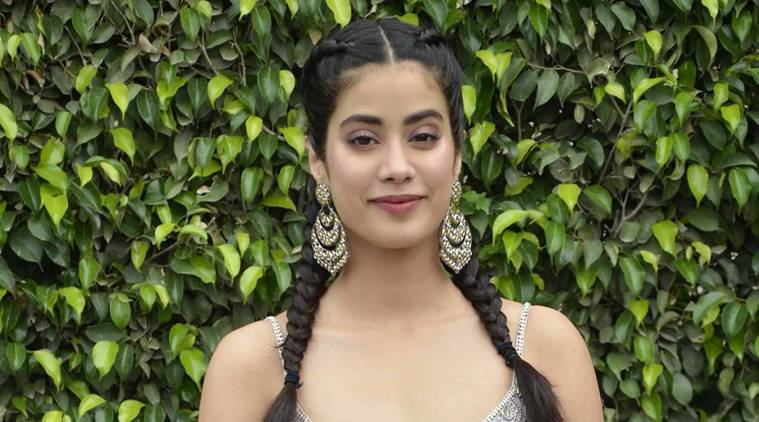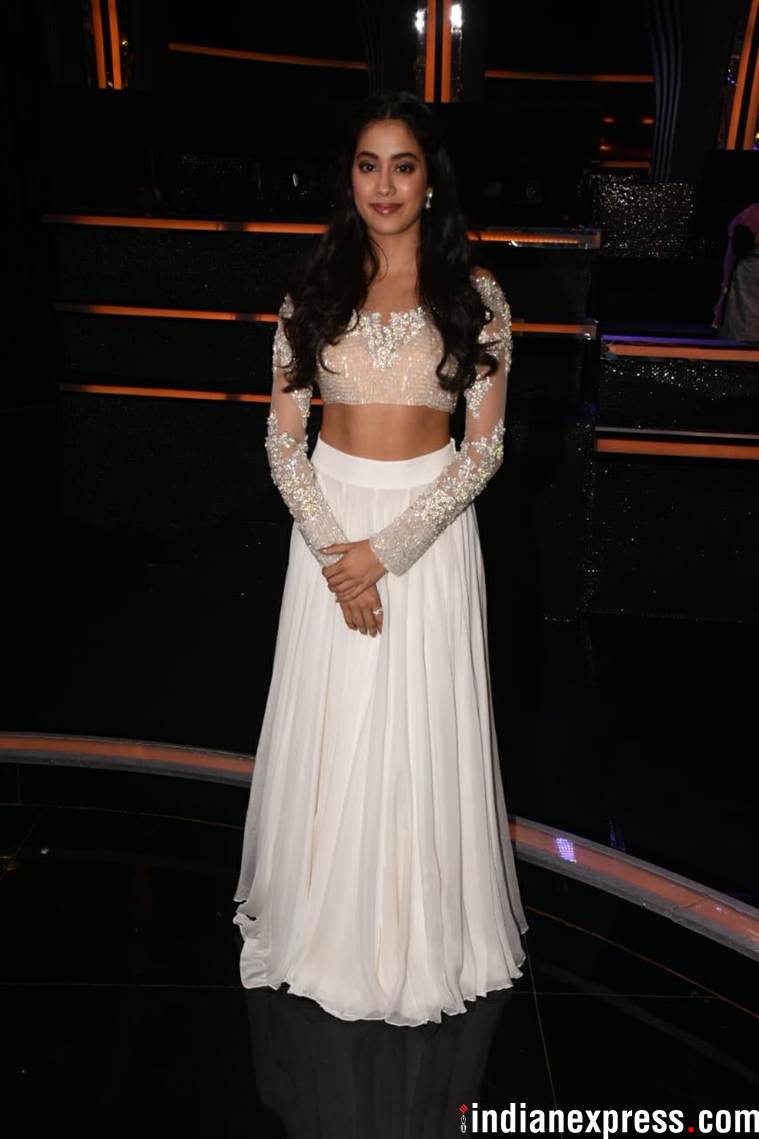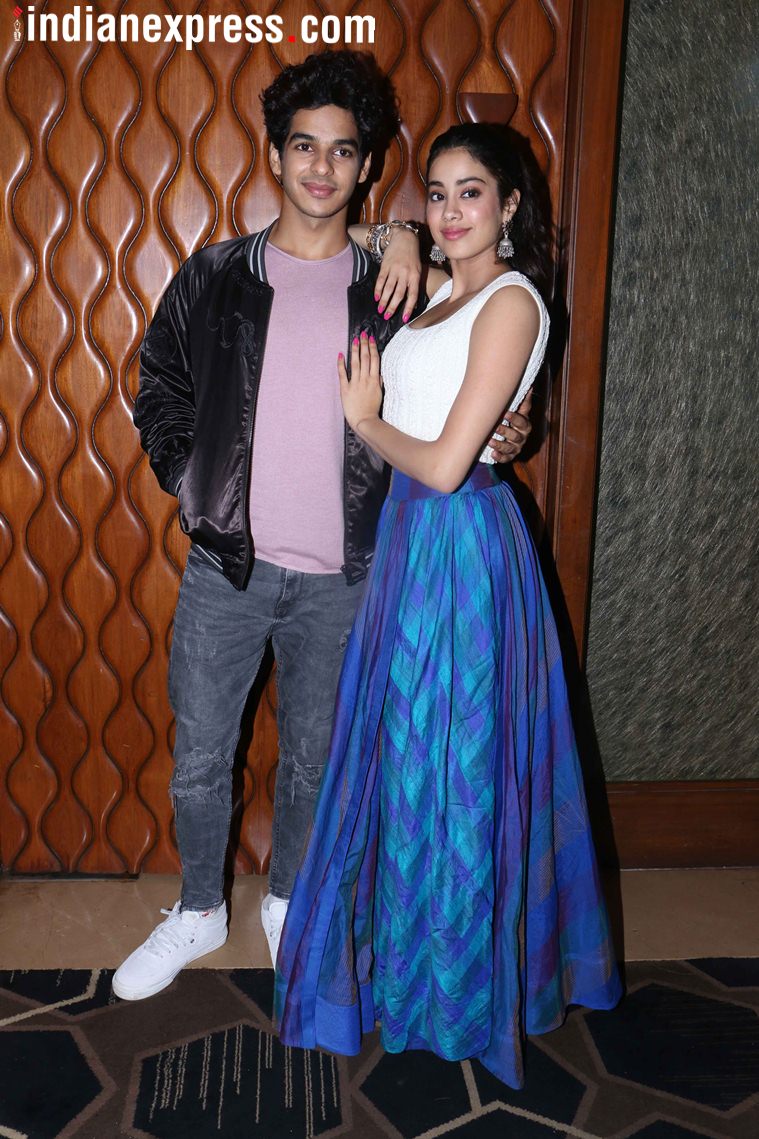Janhvi Kapoor makes her acting debut with Dhadak, which is the Bollywood adaptation of Marathi hit Sairat. Produced by Karan Johar, Dhadak, also starring Ishaan Khatter, will hit screens on July 20.

“I don’t have anything to talk about actually. I know I don’t deserve this attention right now,” Janhvi Kapoor says with an admirable self-awareness. In an interaction with a group of journalists, Janhvi showed the idealism of a 21-year-old and preparedness of a star kid.
Here are excerpts from the interview:
Q. Your first film is up for release and you are already all over the internet. Is it overwhelming?
It is. But I think the aim is to remain positive and to remember that the only reason i am getting this kind of attention is firstly because of my mom and now obviously because of Dhadak. When we were making Dhadak, we were removed from all this noise. We were just trying to tell an honest story and we were just living and creating these moments as our characters. There was a sacred environment. A pure energy that we had around us. I want to maintain that in the middle of this noise.
Q. When you are out in public, cameras follow you. How have you balanced that? Has that been a little difficult?
Although, I am thankful and flattered with this kind of attention, I know I have done nothing to deserve it. Hopefully, after this film, people will appreciate me enough. Then, I will feel I have earned it a little bit but as of now I know it’s not me. I can’t be attached to it. I can’t take it too seriously.
I feel there’s nothing to really talk about except that please come to theatres on July 20 to watch Dhadak. I think I haven’t earned the right to speak about myself that much, so it’s a little weird suddenly seeing so much of myself and having to talk about myself and then reading that stuff. It’s a little unnerving. But if it’s going to help get attention to the film, then I am ready to do it.

Q. What was the reaction when you first told your mother that you wanted to be an actor?
There were a lot of sounds. There was a lot of ‘Aiyyo!’, but I think she knew that the bug had bitten this poor girl.
Q. Was there a particular film of your mother that motivated you to be in this profession? A role that you imitated while growing up?
I don’ think you can imitate anything of my mother. I have seen her on set and in English Vinglish and Mom. I would see her working, so just to see her make that switch as an actor – one second being my mom and yelling at me and the next second, giving a shot. That was the first time I realised there was something really special about her because I had not seen many of her films before that.
It was hard for me to watch her films. I remember watching Chalbaaz at one point. They (other characters) were very mean to her in the film. They were very rude to her, so I couldn’t watch it. I loved watching Sadma because she made Kamal ji (Haasan) cry. Even during English Vinglish, I remember at the Toronto Film Festival, I was sitting in the theatre and clenching my wrist because the daughter in the film was very rude to her.
Q. Did it worry your mother that you were getting it easy?
I think there is a misconception. Maybe I got the opportunity easily. I recognise that. But acting isn’t easy. She was worried about the comparisons a lot more because she kept saying, ‘I have done 400 films and this is your first but they will compare you to my 400th film.’ So, she was very scared about that, But I was like, ‘But I love acting, mumma. I will work hard. I promise.’ I had a very naive, idealistic outlook on all of this but now I am beginning to understand that some people do pay heed to all these comparisons.
They have these expectations, but the thing is that mom has got and still gets so much love and adulation because she earned that. So, I feel a sense of responsibility towards her fans. I want to make them happy and earn the same kind of love. I know I need to work hard for it. I feel responsible. I feel I need to make them happy.
Q. Did your mother urge you to pursue a different career?
When I was a kid, she really wanted me to become a doctor. I don’t know why, and I was like, ‘I am sorry mom, but I don’t have the intellect to become a doctor.’
Janhvi Kapoor with Ishaan Khatter A still from Janhvi Kapoor’s film Dhadak.
Q. Did your mother talk to you about her struggle?
She had a lot of funny stories to tell me. My bedtime stories were all about her shoots, but mom’s struggle was never to prove herself because she started out as a child artiste. It was more like ‘I had 103-degree fever and I was dancing in the rain. My co-star was burping but pretending to be in love with me.’ She painted such a colorful picture of this world, but she was so unattached, unamused by these other worldly experiences.
Q. In this tussle between you and your mother about your career, what role did your father play?
He was very chilled out. He is like a typical Kapoor. He was very supportive. He eased mom into the idea of it. I think my parents have worked very hard to get where they are, but I think people often underestimate how hard it can be to be a producer or actor especially in their times. This is not a 9-5 job. It’s a lifestyle to be in this profession.
He was excited that I chose to prove myself or do something with my life. Mom was like, ‘I have worked this hard because I wanted my children to have it easy, so that they have a relaxed life.’ But I think I wanted a fulfilling one. That meant much more to me. I don’t think I would have been a satisfied person had I just lived off whatever my parents gave me.

Q. Did the nepotism debate bother you?
I understand the debate. Nepotism exists in every industry. I understand why some people might feel robbed off an opportunity and they think I got it easily. I get it and it’s horrible to feel like that because I understand there’s a certain amount of struggle that goes into it but I value this opportunity.
I feel I am unbelievably lucky. I don’t know what I have done right in which lifetime to have got this opportunity. It would be wrong if I act complacent and act as if it’s my birthright to be here, but I won’t. I want to work hard. I want to prove myself.
I am sure there are people much better looking and more talented than me but the point is why should I sacrifice this opportunity that’s been given to me just because there might be other people. I have got this and now what I make of it is most important. I will give this my everything. I am in love with this craft and profession. I want to move people with my work. I want to entertain them. It’s all coming from an honest and a genuine place.

Q. Was your mother worried that you would be asked about nepotism? What did she think of it?
She was more worried about me being compared to her. She didn’t understand the nepotism debate that much because she was like, ‘You are working so hard.’ For her, it was like, ‘Your parents bad karma goes into your children but your parents’ good karma will also go to your children. Why are you being punished for it? You should be punished if you are taking advantage of it.’
